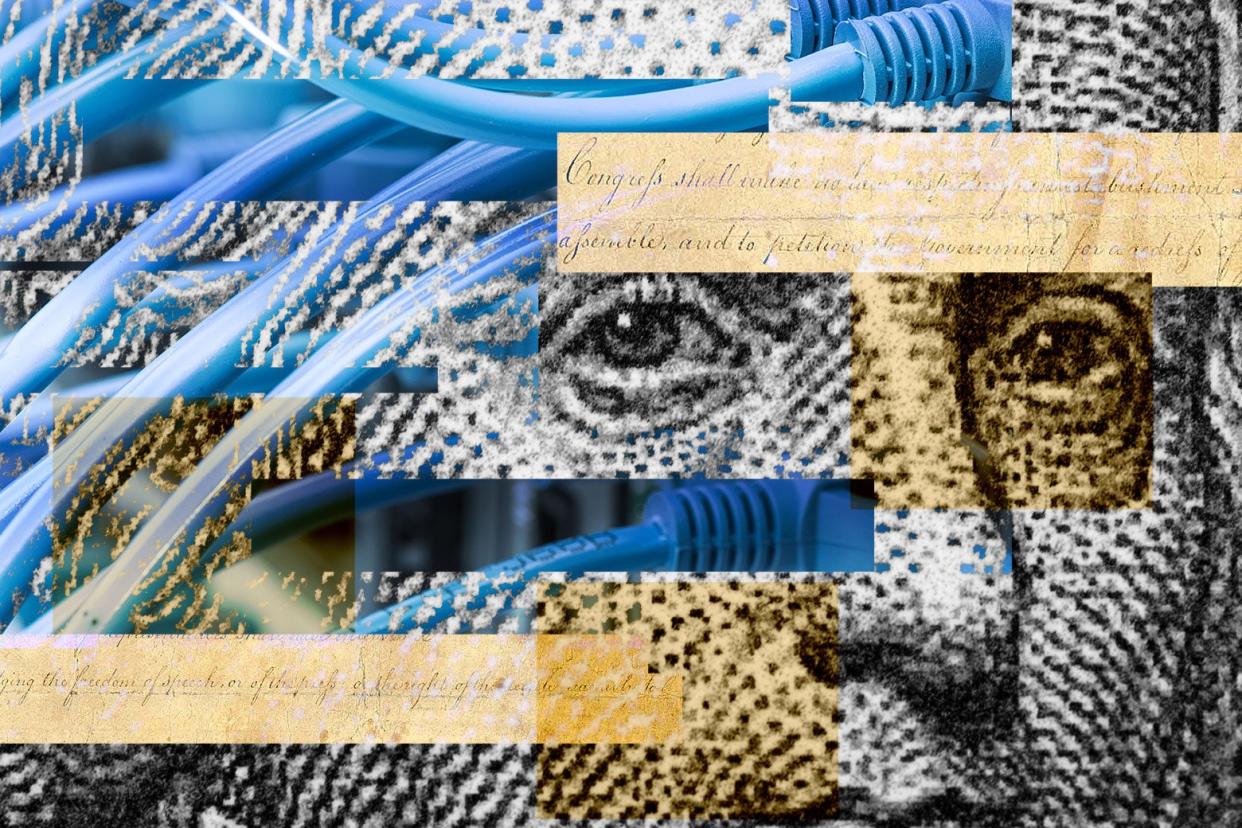Should First Amendment Rights Really Be Getting in the Way of Kids’ Privacy Online?

- Oops!Something went wrong.Please try again later.
Does the First Amendment block the ability of states to protect the online privacy of children? If a lower federal court decision from California is upheld, the astonishing answer is yes. That should trouble all of us.
To fully understand what’s going on here, we have to take a step back. Almost 50 years ago, the Supreme Court launched America on an extraordinary First Amendment experiment. Though no one pretends that James Madison’s First Amendment was meant to protect “commercial speech,” in 1976 the Supreme Court declared almost unanimously that the First Amendment would now defend corporations against the regulation of their words. The original case involved bans on advertising. Very quickly, though, the doctrine morphed to include a burden on anything that might be characterized as speech — including the data corporations gathered from their customers. Even safety warnings have been attacked as “compelled speech”: If it violates the dignity of schoolchildren to be forced to pledge allegiance to the flag, then obviously, this argument claims, it violates the dignity of corporations to be forced to declare how to use their products without causing harm.
The law invalidated by the California court in September, the California Age-Appropriate Design Code Act, was model privacy-protection legislation for the internet age. CAADCA pushed commercial entities on the web to design their platforms to trigger high-privacy settings by default for children; stopped the tracking of children without real-time notice; stopped the selling of kids’ data; required companies to limit the harms from design features such as autoplay, nudges, excessive notifications, and endless feeds; and required privacy notices in language to be accessible to kids. And yet, each of these features—even providing accessible privacy notices—was forced to justify itself under a First Amendment standard that requires a law to advance, as the doctrine has it, a “substantial” state interest “directly,” and “not more extensively than necessary.” (Yeah, it’s just that clear.) Though the lower court conceded that the state’s interest in protecting the privacy of children was indeed substantial, one by one, the judge second-guessed how the Legislature had tried to advance that substantial interest. Forty-five pages later, the law was dead.
Legal doctrine is all about practical consequences. And the practical consequence of decisions like this is that governments, be they state or federal, will have little capacity to protect us from online harms, especially the emerging harms from A.I. The regulation of online commercial activity is always the regulation of code and data. If efforts to push companies to design their online platforms to be more safe are met with challenges under the First Amendment, very quickly, the legislative will to make the internet safe will dry up. Lawsuits are slow and expensive. And if the state loses, the corporation not only earns its freedom from regulation—it also gets to collect its legal fees from the state.
No one doubts that the equivalent regulation offline would be free of constitutional burden. California regulates the design of children’s toys, for example, to ensure that materials are safe and the structures are age-appropriate. No constitutional barriers block those choices. Of course, no one pretends that every regulation makes sense or achieves its objective. But the fight over effective safety regulation is a political one, not a battle of analogical reasoning by lower federal court judges enamored of flowery rhetoric by famous Supreme Court justices.
This was the clear message of the lone dissenting justice in the case that rewrote the First Amendment to protect commercial speech 50 years ago — then-Justice William Rehnquist. Rehnquist was among the most important conservative justices in the modern history of the court. But his conservatism also left the state with “discretion in imposing economic regulations”—to protect both legislative authority and the dignity of the free speech doctrine itself. As he warned, the “logical consequences of … a decision which elevates commercial intercourse … to the same plane as has been previously reserved for the free marketplace of ideas, are far reaching indeed.” Courts, he feared, would “improperly substitute [their] own judgment for that of the State.” The doctrine would “unduly impair a state legislature’s ability to adopt legislation reasonably designed to promote interests that have always been rightly thought to be of great importance to the State.”
Rehnquist could not see just how right his words would become: As life moves increasingly online, regulation must move online as well. If every regulation — including safety regulation—must run the gantlet of First Amendment review just because it involves “code” or “data,” then life online will quickly become a libertarian dystopia: free of regulation, crafted to corporate ends alone.
It is time for the Supreme Court to step back from its “commercial speech” experiment, at least online. No doubt, the state should have no power to skew speech to promote one view over another. No doubt, courts must ensure that political speech is protected fundamentally. But the online world is not found; it is made. And the state needs the power to ensure that it is made in a way that protects traditional values —especially safety and privacy, and especially among children. Ensuring privacy — what Brandeis referred to as the right to be left alone—is not the regulation of speech. Requiring that children are protected from manipulative and exploitative advertising is not state-sponsored censorship. The court should return the First Amendment to its core and important purpose : to protect against state-enforced ideology and attitudes and to secure healthy political debate. That critical purpose is far from California’s efforts to secure safety online.

